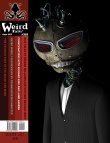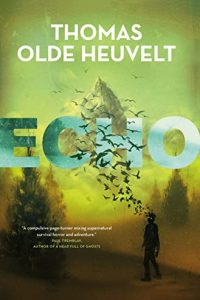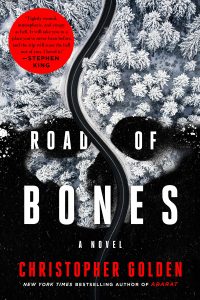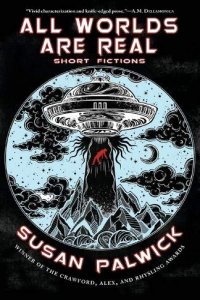Lois Tilton reviews Short Fiction, early April
A last-chance review of Weird Tales, along with the usual and less usual first-of-the-month ezines.
Publications Reviewed
- Weird Tales #359, Winter 2012
- Clarkesworld, April 2012
- Redstone Science Fiction, 23 April 2012
- Apex Magazine, April 2012
- Kaleidotrope, Spring 2012
- GigaNotoSaurus, April 2012
A sort of first and last, at the same time. I had for some time been wondering about the VanderMeer-edited version of this venerable zine, yet none of my queries had ever produced a review copy. Now, with the magazine sold and a new editorial team about to move in, I finally obtained a copy of the old crew’s last issue.
The settings are mostly contemporary, with a bit of the weird future thrown in, and, in this issue at least, there is a distinctly British tone. No Chthulu, no barbarians. I would characterize it overall as horror rather than dark fantasy, although the affect is more often depression and despair than fear or revulsion. Certainly several of the stories are worth reading, but overall I can’t say that I regret missing the zine so very much as I had supposed I might.
“Notes from the Apocalypse” by Stephen Graham Jones
Zombies. By now, every new zombie story has become a sort of challenge – can this one manage to say something new about such an overused and uncredible trope? Jones does. In a series of vignettes, he manages to show us how human survivors can be even more appalling than the devouring undead.
. . . whenever it happens, — and it will – that you’re making your mad dash away from whatever horde you’ve stumbled onto, and they’re gaining like they always do, then all you have to do is, without breaking stride, pull on the cat or puppy by whatever your dominant hand is, and splash it down onto the ground.
Nastily imaginative.
“The Magician’s Apprentice” by Tamsyn Muir
Cherry begins her apprenticeship at age thirteen, and it’s hard, tedious work that she masters very slowly and painfully under her master’s close direction.
Magic wore terrible holes in you. Just shunting water around would give her a headache and throbbing nosebleeds, so he’d fry up a steak or fresh brown eggs and watch her gobble them down while saying, “Elbows off the table.”
No glamour in these magic lessons, and more than a hint of pedophilia hanging over the growing relationship between master and apprentice, which the author makes explicit when their literary studies turn to Lolita. Readers may already be so creeped out by the time they reach the ending that the shock value has already worn off.
“Five Films Reviewed by Frankenstein’s Creature” by Even J Peterson
A set of vignettes, seeing the horror classics from a different point of view.
“The One That’s Worse Than Mine” by Tom Underberg
The narrator is a sin eater, technologically enhanced, working for a corporation that sends him out on the road. We don’t know what the corporation gets out of it, but the narrator is looking for someone with a sin worse than his own, the moment that haunts his dreams.
“It’s worth it. You’ll be free of the pain and sorrow and regret you’re holding inside. We all make mistakes,” I say, keeping my voices carefully neutral. “It’s what makes us human. This gives you a chance to go on.”
An odd scenario, in which apparently clients can only have a single sin removed over a lifetime, and we never learn what happens to the sin eaters after their sin-collecting implants are filled. The exact details of the narrator’s sin are never quite clear, although they involve the deaths of his wife and daughter. The setting is a decayed future when UV radiation traps the population inside during the daylight hours, giving the impression of a world of vampires, more depressive than horrific.
“Watcher” by Leena Likitalo
An artificial fantasy scenario in which three kinds of beings play out preordained roles, all envious of the others. While not exactly surreal, the situation can make no sense to the readers, who have no idea what purpose, if any, it serves. That, I believe is the point: the apparent purposelessness of existence.
“Waiting for the Thaw” by Joel Lane
One snowy February, the police are called to an apartment where the tenant has disappeared, and the landlord has discovered a pair of corpses in his place – an old man and a young boy, both apparently starved to death. There is also a notebook in which the absent tenant has written of his descent into despair. Naturally, the police discount the evidence of the notebook, which suggests that the tenant has become involved with something arcane, and fail to consider the full implications of the DNA evidence.
This works best as a metaphor for hope, as the tenant believes that he is engaging in a kind of spell that will bring the thaw of despair.
The city coming to life. Trees, birds, cats. And people. Life everywhere, breathing and dancing and caressing.
Something magical happens, but the details are obscure. It’s possible that the tenant was taken in by a bunch of con artists who recognized his vulnerability. Because snow in February is perfectly normal, and a thaw will come in its own time, even if we might think it never will.
“f/8” by Conrad Williams
After personal tragedy blights his life, Tommy goes out with his camera and the apparent intention of getting himself struck by lightning. At which he succeeds.
He released the shutter again. This time, fifteen seconds into the exposure, the lightning came. Thunder surrounded him almost at the same moment. He jumped, lost his footing. He put out a hand to steady himself but wrenched over to one side when he realised the exposure was not yet completed; if he touched the tripod the shot would be ruined.
After he is released from the hospital, he looks at the images on his camera and finds one he can’t remember, of a longhaired, ragged figure that begins to haunt his daily existence. He experiences memories that are not his own.
An unusual sort of ghost story, which seems to be the most likely pigeonhole for it, if not mystery. Some nicely vivid images.
Clarkesworld, April 2012
A very mixed selection of SF and science fantasy.
“Fragmentation, or Ten Thousand Goodbyes” by Tom Crosshill
Rico realizes that he’s losing his wife, as she becomes someone different, someone less human, with every augmentation. He also fears that he will soon lose his totally unaugmented centenarian mother, and he’s concerned for her failing mind – as he sees it.
Every time Mom says goodbye to someone, it’s for the last time. She thinks — no, she knows — that she’ll never see them again. Not the mailman. Not her best friend Abby. Not me.
But the old woman is wiser than her son.
A nice examination of personal identity – the self that the self knows and the self that others know, or believe that they know.
“Draftyhouse” by Erik Amundsen
A ghost story set on the moon. The scenario is on the side of surreal, and we are less inclined to believe the protagonist’s account when he admits to being a habitual drunk. It seems that the moon has long been colonized, its denizens called astronauts because they wear leather spacesuits. Shenroos is now the only inhabitant of Draftyhouse, possibly the only human remaining on the moon. He was ordered to leave a week ago, but declined. He is drunk when a ghost enters the house, riding on a ghostly elk. In a dream, it asks him the question, “What is the purpose of the Draftyhouse?” And Shenroos wakes to find his hands covered by a thin film of soot.
Covered in soot. Shenroos is finding it on all surfaces he checks; fine, greasy, streaks in odd places in the rooms that fall under his titles. Other places are almost coated and his sensibilities tell him that there is more weight inside the house. Something new has arrived, bringing ghosts.
The most interesting of the stories here, eventually revealing itself as a mystery, which is the question asked by the astronaut ghost. There’s a mad elegance to the scenario, though the answer, when we figure it out, is entirely rational, in the context.
–RECOMMENDED
“The Womb Factory” by Peter M Ferenczi
Unlike other SFnal womb factories, this one exists to incubate biobots, expensive organic toys with a computer core. Mei is there unwillingly, rebelliously, unlike most of the other, more acquiescent girls.
Although it makes sense that a facility like this one would be located in China, where girls have long been considered a burden on a family, I see no reason why human wombs would be required for such a project at all. As Mei’s case makes clear, there are clear disadvantages in it – as opposed to, say, sows or some more easily contented species.
Redstone Science Fiction, April 2012
Two stories of artificial life.
“An Early Adoption” by Rahul Kanakia
A world where most people have gone “inside” to a virtual existence in which everything is possible. Chandrani is a long-time resident who has learned the drawbacks of flying elephants and housecats in the bodies of tigers. Her specialty is coding chili peppers for maximum faithfulness to the real thing. When a newly-arrived old friend issues an invitation, Chandrani is both embarrassed and contemptuous.
I pulled out my phone and used a disincorporation app to erase the elephant from existence. Normally, it would be considered shockingly rude to destroy a friend’s creation, but Maya clearly had no understanding of ordinary politeness.
Essentially a story of people who hide the truth about themselves from themselves. Chandrani is a disagreeable character, her critical attitude only exposing her own insecurity.
“Men and Their Toy” by Jacob A Boyd
Dolly is a sex toy, an expensive one who has been owned by a series of wealthy and powerful men who all had a far more powerful enemy. Now that man has purchased her in order to access her intimate knowledge of all those defeated rivals. Tersk is obviously a brutal man; his employees fear him. Dolly does not seem to.
“Only you could find and get to those who owned me before. Now, I am in the safest place I could be. All that was theirs is now yours. Who would want to attack you, let alone so much as insult you? What is there to be afraid of?”
The narrative here is essentially a dialogue between Dolly and Tersk. We see nothing of Dolly’s inner thoughts or feelings, to the extent that she may have them. Is she really so confident, or is she bluffing? The unanswered question makes this one intriguing. The ending has a sting.
Apex Magazine, April 2012
An “International SF” issue, celebrating the release of the publisher’s Book of World SF 2 anthology. Which makes it also a Lavie Tidhar issue, as he is the anthology series’ editor and also has an original story in the magazine.
“Love is a Parasite Theme” by Lavie Tidhar
Or is it meme? “It won’t let go, it hangs on and transmits from person to person, it’s a sickness.” So says woman whom the narrator loves. This is after the end of the world, and there may not be any other humans left; the narrator claims there aren’t, but he lies a lot.
There weren’t any more people but the two of them, but there never were, anyway. Life was love and everything outside of it was backdrop, it was scenery—
A poignant vignette about the possibility of love in the absence of hope.
“The Second Card of the Major Arcana” by Thoraiya Dyer
A story of riddles. The Sphinx, for it is she taking the role of the High Priestess, has been awakened by a person she takes for a priest, and she searches for him now to rebuild her temple for her. But it is a time far, far from the Sphinx’s, a time in our own future as well. Things have changed, and few people know the Sphinx’s riddles in those days.
A warty-nosed old woman stops her car at the side of the road to offer me a lift to Beirut. There is a basket of ripe pomegranates on the passenger seat.
“Ride with me.”
“Aphrodite rides with you already,” I say. “I am no human lover.”
The riddles make this one special, as the standard roles change and the old incantations work differently. The Sphinx, even more so than in her own time, is not to be trifled with.
Kaleidotrope, Spring 2012
Quite a few ghosts and such in this quarterly issue, but they are spirits of fantasy, not horror.
“Those Who Came Before” by Nicholas J Carter
An ogre hunts maidens in the land, and one of their ghosts watches him with a certain admiration.
I am transfixed by the way he strips and cures our meat, makes pale leather of our snowy-white skin, makes jewelry of our bones and ornaments of our skulls. A craftsman, that’s what he is. My own black hair he spun into a dream catcher dark as jet, and he hung my pretty fingerbones from several loose strands that dangled from it. They clack together when a strong wind strikes deep into the cave — though this is not often — and then I feel a tingle where my spirit thinks fingers should still be.
A very different point of view on the usual fairytale scenario. The ghost is quite convincing.
“Commuter Train” by Brady Golden
Urban legends. New to the city and new on the job, Lisa mentions to a co-worker that she has seen a ghost on the BART train. He tells her that it’s a well-known urban legend. One thing leading to another, they embark on an affair, despite Gabe being [unhappily, or so he claims] married.
So far, she hasn’t taken their relationship too seriously. It’s something new that’s happening to her, an affair, and its novelty has its appeal. She’s attracted to him, enjoys being attracted to him, and enjoys having that attraction reciprocated, but she’s not passionate about it. She’s had better sex with better-looking guys, long ago though it may have been. Still, secret lunches and secret lays give her something that she needs. Friendship. Companionship. Someone who will touch her. Hell, someone who will talk to her.
Essentially, this is a contemporary story about an affair, the ghost being, at most, a catalyst. Lisa’s behavior is hard to comprehend, except as self-destruction, but I don’t think even she understands why. It’s disturbing, much more so than the poor innocuous ghost.
“In Exchange for Sorrow” by Damien Walters Grintalis
Humanity has developed wings, but Lilita fails to grow them. As her parents consider euthanasia to eliminate the shame, she runs away to the forest, where Magic Happens.
As the clouds lowered their bulk and carried the sun below the horizon, she wandered until she reached a forest far from town. A place of shadows and tall trees and secret hiding places within the trees and without. When the wind blew, the trees did not whisper freak. They did not discuss doctors or cold needles. They did not know she was supposed to have wings.
Not adult fiction. Lots of emotional chain-pulling.
“Voices” by Lindsey Duncan
Quissara is an assassin. It’s a living.
The Contract had a monopoly, but you had to be as pathetic for escape as I was to join. The Orators gave us another legacy: if you ended a life, you lived with the spirit for the rest of yours. Find me someone who wants to live with an angry horde of victims roiling about her mind, and I’ll show you a candidate for the Contract.
But when about to dispatch her latest target, she is disconcerted to be confronted by a ghost – not one of her own dead, but one who seems to know her well enough to rebuke her for her way of life.
Readers will probably figure out the mystery before Quissara does, although the final twist is interesting. But this is because there is something wrong with Quissara that we don’t know. It makes rather a hole in the story. I like the interaction between the assassin and her voices – another case of the dead forming a bond with their killers.
“Dead on the Doorstep” by Peter Cooper
There’s a dead bloke at Eleanor’s door. A bother. “You! What are you doing here, in broad daylight? Don’t you know it’s against the rules?”
A really funny take on one of the oldest scary campfire stories.
“Weekend at Byron’s” by Justin Teerlinck
Egregiously ridiculous. It’s clear that this is what the author intended, for humorous effect, but I wish he hadn’t.
“What shall we do?” cried Shelley. “Lady Lamb is already at the door and she will not leave until she has had an audience. She means to force Byron to love her. Not only that, but several of Byron’s creditors have appeared with her, as well as a train of unclaimed bastards with questionable sireage begging alms and several lions, cotimundi, and tapirs with collars and tags bearing Lord Byron’s seal.”
“Traveler” by Colin Heintze
The narrator is some sort of alien consciousness who has been on Earth a very long time, entering the minds of human hosts and acting the role of a god. But other gods have taken over, and the minds of the hosts are no longer open to travelers.
These days I would have to push and struggle and sneak through the back-doors of consciousness just to steal a glimpse inside an uncooperative host. And, when my host’s mind realizes a trespasser has entered, I would be violently rejected by a consciousness unwilling to entertain a concept in conflict with its own understanding of the world.
The narrator decides that the fellow traveler/god inhabiting the mind of the warlord Timur is the enemy, and directs the dwindling number of its hosts to destroy him.
Ends in a sentimental religious epiphany.
GigaNotoSaurus, April 2012
“End Run” by Dr. Philip Edward Kaldon
Green Ensign Darlene Charles reports aboard he new assignment, meets every single officer and member of the crew and learns every single rope, in an appallingly prolonged and dull narrative. If this were the opening chapter of a novel – which I have my suspicions it might be – the length might be excusable. Not the dullness. And when the expected Crisis finally arrives, instead of our heroine’s competence, what readers are more likely to see are the dominoes so carefully set up by the author falling clickety into place without ruffling our composure by any narrative tension.








Lois: You never got copies because you were incredibly negative about the transition to Ann as editor. You said up-front you would hate it…soooooo, why would they send you something you seemed predisposed to trash? And clearly you didn’t get it this time around, either.
Dear Lois,
I read your review of my story, “Twenty-Two and You” (in the Feb/March issue of F&SF), the other day. Your point about the changes a woman undergoes when she’s expecting, and how this would overwhelm and render inconsequential the memory loss my character experiences in the story, gave me pause for thought. In particular, it made me think more deeply about the nature of memory and the loss of memory, or more precisely the alteration of memory. We know that memory exists on many levels: neurologic, immunologic, cellular, genetic, to name just a few. These systems are dynamic, and they can and do change throughout an individual’s life. The woman in the story had a major and profound biological intervention, and I’d have to say her memory changed on multiple levels: from conscious to subconscious to instinctive and further, from the re-writing of her synapses to the re-calibrating of her hormones to the re-programming of her cells. This can happen, and in her case it did. Your comment gave me a chance to go back to the story and make this clearer and more explicit. So thank you. Happily, people will be able to read the new version later this year, when my second story collection, WHAT THE DOCTOR ORDERED: Tales of the Bizarre and the Unexpected, comes out. Don’t know if you review collections, but if you do, I’d be pleased to have the publisher send you a copy.
All the Best,
Michael Blumlein
Michael – I recall how moving the conclusion of that story is.
My quibble was not with the changes the character underwent, which were quite convincing, but with ascribing them to memory, when I would have said, Mind.